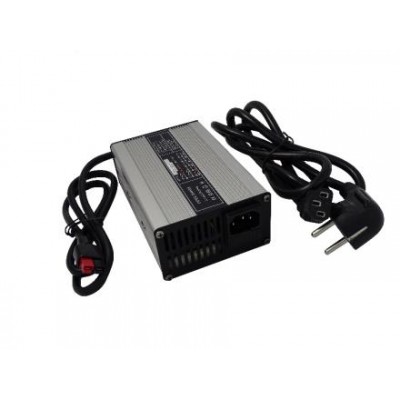Chargeur 24V 3A pour batteries au Lithium Fer Phosphate (LifePo4). Il possède en sortie une prise Anderson PP30 compatible avec le connecteur des batteries SOLISE.
# CARACTERISTIQUES TECHNIQUES #
Tension d'entrée : 200 à 400V AC 50/60Hz
Tension de charge : 29.4V +/- 0.2 VDC
Tension de charge min : 18 VDC
Courant de sortie : 3A +/- 10%
Puissance à vide : <0.5W
Rendement : 85% à courant nominal
T° de fonctionnement : -29°C à 45°C
T° de stockage : -40°C à 75°C
Dimensions : 160mm x 90mm x 50mm
Poids : 0.6Kg
Protection contre les courts-circuits
Protection contre les surcharges
Protection contre les surtensions
Fusible de protection en sortie de chargeur (Batterie)
Fusible de protection en entrée de chargeur (Secteur)
Voyant de fonctionnement
RECOMMENDATIONS FOR USING SOLISE LITHIUM CHARGERS
To ensure optimum, safe performance and optimise the service life of your SOLISE lithium chargers, we recommend that you follow these guidelines :
- Charging time : Do not leave the charger connected to the battery for more than 72 hours.
- Electrical safety : Do not dismantle the appliance. There is a risk of electric shock if the internal components are handled incorrectly.
- Exposure to water : Do not expose the charger to falling water or immerse it. Water can cause short circuits and irreversible damage to the charger.
- Battery compatibility : Only connect lithium batteries suitable for either LiFePO4 or NMC technology to this charger. Using non-compatible batteries may lead to malfunctions or safety risks.
- Correct polarity : Make sure you observe the correct polarity when connecting the battery to the charger.
RECYCLING OF CHARGERS USES
These products should not be thrown in the bin. You can return them to dedicated collection points, such as waste collection centres, supermarkets or DIY shops, so that they can be recycled in an appropriate and environmentally-friendly way.





